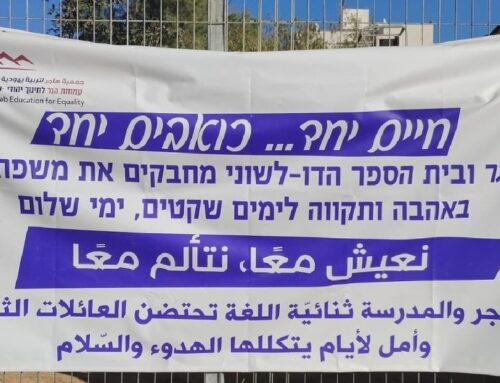Lilly here. This is about what it means to be a Zionist. The following is excerpted from “2010-2020: A Decade of Repair,” published in The Jerusalem Report by Shalom (Shuli) Dichter, the coexecutive director of Sikkuy, the Association for the Advancement of Civic Equality, from 1998 to 2008:
THE EVENTS OF OCTOBER 2000 SHATTERED THE veneer of “co-existence” and laid bare the frustration, distrust and, especially, marginalization and alienation felt by the Arab- Palestinian citizens of Israel. …
… Many Jews despaired. Nationalistic sentiments took center stage, fanned also by the brutality of the second intifada’s suicide bombers following the failed Israeli-Palestinian peace negotiations at Camp David in the summer of 2000. Over the decade and especially over the last two years, we have been witness to an increase in racist discriminatory legislation against Arab citizens, although at least some of this legislation has been blocked by a few of our more reasonable politicians.
At the same time, we are also witness to developments that may prepare Israel for the next decade, the decade of repair (tikun): A Paradigm Shift: … the Orr Commission, established to investigate the causes of and responses to the events of October 2000, presented a new paradigm. …
Arab-Palestinian Initiative: In December 2006, a group of 38 Arab- Palestinian leaders and intellectuals, all citizens of Israel, published the Future Vision Papers, in which they outline a new framework for dialogue with the Jewish majority. The papers state clearly that Arab- Palestinians view themselves as a minority seeking group rights as an indigenous people and offer suggestions for ways to implement these rights. As a Zionist Jew, I read these papers with great resentment; yet I also know that the writers have laid down the foundation for a new form of dialogue and we must not reject their initiatives.
Knowledge and Expertise: Academic and advocacy organizations have developed knowledge and expertise that is finally making its way into the corridors of power. In the early 1990s, NGOs had to struggle even to prove that discrimination exists. Today, more and more government officials are attending conferences, responding to the uncomfortable findings and policy papers, and cooperating with the organizations and the academics to develop mechanisms for the implementation of equality-oriented policies.
Acknowledgment and Commitment: In June 2008, at the first Conference on Israeli Arab Issues organized by the Prime Minister’s Office, … Ehud Olmert acknowledged that all past governments had wrongfully discriminated against Arab citizens and declared his commitment to righting this wrong. … Olmert formed the Authority for Minority Economic Development, which is now the responsibility of Minister Avishai Braverman. On March 18, the Cabinet resolved to allocate 800 million shekels ($225 m.) over four years to 13 large Arab communities…. The resolution further instructs Braverman to prepare a … multi-faceted policy of integration of Arab-Palestinian citizens, … to be implemented over the following decade.
American Jewish Community: In July 2004, a group of Jewish leaders gathered in New York to discuss the role of American Jewry in helping to improve relations between Israel and its Arab-Palestinian citizens. The meeting led to the establishment, several months later, of the Inter-Agency Task Force on Arab Issues in Israel. Hosted by the Joint Distribution Committee, the Task Force now includes some 90 organizations in the US and the UK. …
At the end of this decade, most Jews now understand that some 17 percent of Israel’s citizens identify as Arab Palestinians – and they are not leaving the country. …
Over this same decade, Arab-Palestinian citizens have come to understand that the Jewish sense of collectivity will not evaporate or diminish and that the Arab Palestinians’ newly-adopted harsh style of discourse has made it difficult for Jews to embrace the concept of equal citizenship. Furthermore, Arab-Palestinian leaders realize that in order to benefit equally from the state’s resources, their municipal leadership must fundamentally improve local governance.
…Numerous issues must be solved over the next decade: housing, planning and lands; integration of the largely isolated Arab economy into the state’s economic life; radical yet sensitive solutions to the problems of the Bedouins in the Negev; systematic development of good local governance; social enhancement of Arab-Palestinian society; providing youth with the opportunity for higher education; and last – but certainly not least – elimination of all shapes and forms of racism against Arab Palestinians of Israel.
…. This is The Zionist challenge of the coming decade.






Leave A Comment